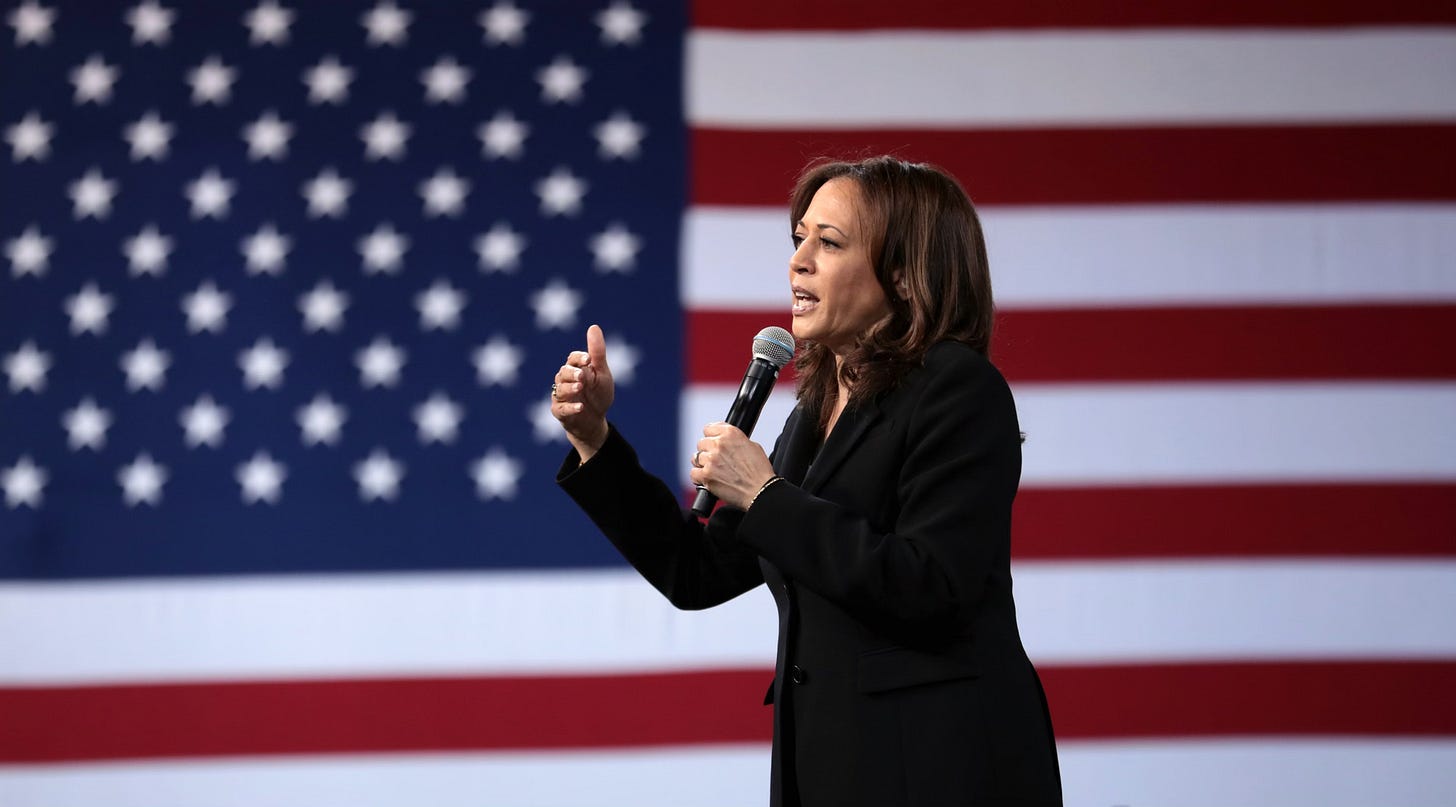A Party Led by the Poster Child of Affirmative Action for the Privileged Shouldn’t Slam Kamala Harris as a DEI Candidate
Republicans could highlight her troubling record as a prosecutor but are playing the race card instead
In the aftermath of Joe Biden’s withdrawal from the 2024 presidential race, Kamala Harris swiftly staked an undisputed claim on the Democratic nomination, united a newly energized party, unleashed a flood of contributions, and came close to overtaking Donald Trump in the polls. It was a flawless launch of a campaign that had to be assembled virtually overnight. As her opponents, it would have been too much to expect Republicans to pause to admire her political skills and bold resolve. There are truly troubling things in her record as a public prosecutor and attorney general in the Golden State that they could fairly highlight. But the public line they are taking—deriding her as a “DEI hire”—smacks of racism and desperation.
In their view, Harris has achieved her current position only because of her race and gender.
Republicans’ Derogatory ‘DEI’ Dig
Trump said she is “dumb as a rock” and “a low-IQ individual.” Rep. Harriett Hageman of Wyoming insisted she is “intellectually, just really kind of the bottom of the barrel.” New York Times columnist Ross Douthat mocked her as “a liberal answer to Dan Quayle.” Former Trump White House aide Sebastian Gorka said Democrats are ready to anoint someone “who cackles like an insane woman” solely “because she's female and her skin color is the correct DEI color.”
In one sense, of course, there is some truth in the charge. Among the reasons Biden chose Harris as his running mate were that, being black and female, she complemented his white maleness in ways that would strengthen the ticket—helping both with women, who make up more than half of all voters, and African Americans, a crucial Democratic constituency, not to mention Americans of South Asian origins.
But there’s nothing new or outrageous about considering such factors. As the New York Times’ Jane Coaston noted: “JD Vance and Mike Pence were [themselves] ‘identity hires.’” Trump picked the pious Mike Pence to reassure conservative Christians who might be wary of an infamous philanderer and fraudster who couldn’t find his way to a church pew with a map. Mitt Romney chose Paul Ryan to enhance his appeal to Tea Partiers who regarded the former Massachusetts governor as dangerously squishy. John McCain made the ill-fated choice of Sarah Palin in an attempt to appease conservatives and women.
Presidential nominees have long sought to balance their tickets with running mates who differed from them in characteristics that might broaden their appeal—including age, geography, ideology, and background. But for most of our history, the pool of those considered for the role was limited to white males. They benefited from long-established racial and gender preferences that excluded women and people of color. Today, to the shock of some, Caucasian men no longer enjoy that unearned status—though, in her own concession to diversity, Harris is likely to choose one, just as Barack Obama did.
Conservatives only now find it objectionable to weigh factors beyond some objective ideal of merit. Harris’ race and gender are obvious targets for a GOP whose party faithful include those who: believe that whites face more discrimination than Blacks, harbor an affection for the Confederate flag, reject reproductive freedom for women, and think undocumented immigrants are “poisoning the blood of our country,” as Trump put it.
Kamala’s Qualifications
The sophisticated version of this attack came from New York Times columnist Bret Stephens, who decries the vice president as a “lightweight” guilty of “excruciating banality” and asks: “How did a person who failed her first bar exam when more than 72% of her cohort reportedly passed, but cultivated powerful friends, become a D.A. and an A.G.? When Biden came under extreme pressure to narrow his vice-presidential search to Black women, did merit become secondary to race?”
Fact check: Biden didn’t promise to choose a black woman as his No. 2; he promised to choose a woman. But the answer to Stephens’ second question is “no.” When it comes to running mates, “merit” includes all sorts of factors that go beyond SAT scores and resume highlights, and Harris outshone Biden’s other contenders. But to suggest that she’s a dimwit who manipulated her way to the top—or, as some right-wingers salaciously charge, slept her way there—grossly misrepresents reality. Harris did fail the California bar exam, widely considered the nation’s toughest, on her first try. You know who else suffered that setback? Kathleen Sullivan, who at the time was a professor of law at Stanford, before becoming dean. Democrat Jerry Brown, who served as the 34th and 39th governor of California, flunked the exam after graduating from Yale Law School. Republican Pete Wilson, who was governor and senator, needed four tries to pass it.
In 1989, Harris got her J.D. at the Hastings College of Law at the University of California, San Francisco, where she was president of the Black Law Students Association. During her time there, it was on its way to becoming a top-20 law school, a US News and World Report ranking it achieved in 1991. “In those days, Hastings had emerged as a prestigious perch for aspiring litigators,” noted Politico in a 2021 account of her law school experience. Harris went on to pass the bar on her second try and immediately went to work as a deputy district attorney for Alameda County, the first of several jobs on the side of law enforcement.
Stephens wonders: How did she get to be district attorney of San Francisco and attorney general of California? As her biographer Dan Morain notes, “Harris arrived in San Francisco in 1989 without money or pedigree.” She wasn’t a Bush or a Kennedy. So she had to ascend the ladder as countless other politicians have: by working hard, proving herself, establishing relationships and alliances with people who could help, persuading voters, seizing opportunities, and getting lucky. There are no “DEI hires” in elective politics—only losing candidates and winning ones. Harris has repeatedly been the latter.
Even her unsuccessful 2019 presidential campaign led upward, to her selection as Biden’s running mate. “Her experience as a battle-tested presidential candidate, her efforts leading major law enforcement offices, and her political track record of three election wins in California helped her overcome a crowded list of contenders,” reported Politico.
A Trump-Led Party Has No Standing To Question Its Rivals’ Intelligence
The charge that Harris has been elevated above her talents is one every Black political figure faces. When Susan Rice was under consideration for secretary of state, John McCain said she was “not qualified”—even though the former Rhodes Scholar’s career included stints as assistant secretary of state, UN ambassador, and national security advisor to President Obama. When Biden nominated a Black woman to the Supreme Court, the Heritage Foundation put out a statement that “Judge Ketanji Brown Jackson Is Not Qualified for Supreme Court”—even though she was an editor of the Harvard Law Review, clerked for Justice Stephen Breyer, and served as a federal district and appellate judge.
In 2011, Trump questioned how Barack Obama got into Harvard Law school, declaring “I heard he was a terrible student, terrible” as an undergrad at Columbia. After getting to Cambridge, Obama graduated magna cum laude and was elected president of the Harvard Law Review. He also wrote a critically acclaimed book, Dreams of My Father, which did so well that Trump insisted Obama didn’t write it—a case of projection, no doubt. Trump, whose byline adorns such works as The Art of the Deal, Think Like a Billionaire, and Think Big and Kick Ass, is the rare author who has written—sorry, “written”—more books than he has read.
For Republicans to champion the highest standards of intellectual aptitude in public office is an unexpected turn. Often, the party has promoted a contemptuous anti-intellectualism. Sarah Palin wandered through four different colleges before getting a degree from the University of Idaho, and she exhibited world-class ignorance during her vice-presidential campaign. Republicans made a virtue of her indifference to matters of the mind: At the 2008 convention, Sen. Fred Thompson celebrated her as “the only nominee in the history of either party who knows how to properly field-dress a moose.” John McCain, who chose her as his running mate, finished near the bottom of his class at the Naval Academy. Trump boasts of graduating first in his undergraduate class at the University of Pennsylvania’s Wharton School when in reality he failed to make the dean’s list or graduate with honors—and one professor recalled him as “the dumbest goddamn student I ever had.”
Like most politicians, Harris has been guilty of occasional verbal missteps, word salads, and vacuous inanities. But you don’t succeed as a prosecutor if you’re unable to reason your way through complicated factual matters, deliver pithy oral arguments, or think on your feet. In a profile in the Atlantic, Elaina Plott Calabro wrote, “She is always asking aides to get to the point: Show me the data; show me the metrics.” (A sentence Trump would utter only in the context of TV ratings.) Harris has demonstrated in interviews, speeches, and congressional hearings that she’s fully capable of handling the intellectual demands of the presidency. Since the Supreme Court overturned Roe v. Wade, she’s been an effective defender of abortion rights.
Judge Harris On Her Actions—Not Her Race
That is not to deny that Harris has serious flaws when it comes to public policy, particularly criminal justice. As district attorney and attorney general, Reason's Elizabeth Nolan Brown noted in 2019, she pushed “for harsher sentences, larger bail requirements, longer prison terms, more prosecution of petty crimes, greater criminal justice involvement in low-income and minority communities, less due process for people in the system, less transparency, and less accountability for bad cops.” In her first presidential campaign, however, she took a very different path, advocating the abolition of cash bail, solitary confinement, and federal mandatory minimum sentences.
Those aren’t the only stains on her record. She endorsed a law allowing parents to be fined and even jailed if their kids were habitually truant from school. She opposed the legalization of marijuana. After the U.S. Supreme Court ruled that overcrowding in California prisons violated the Constitution, she opposed measures to free some inmates. “Lawyers for Attorney General Kamala Harris had argued in court that if forced to release these inmates early, prisons would lose an important labor pool,” the Los Angeles Times reported. She fought efforts to overturn convictions in cases where prosecutors withheld evidence. Daniel Larsen, wrongly convicted of murder, was finally freed after 13 years over the objections of Harris, who argued that he was too late in presenting the evidence of his innocence.
“There’s plenty of room for criticism, though I don't think her record is much worse than your typical prosecutor or AG,” journalist Radley Balko, whose newsletter The Watch focuses on law enforcement abuses, told me.
She has done some good things since on police reform, bail reform, etc., since including sponsoring a Senate bill to provide federal funding for public defense, which makes her one of the few politicians at that level who actually understands the importance of indigent defense. I think she should say she has evolved as she's become more aware of systemic problems.
Harris is also the presumptive nominee of a party that is far more attuned to the need for criminal justice reform, and she’s likely to pursue policies reflecting that Democratic consensus. Trump, by contrast, cares about the issue only as it affects him, his cronies, or the Jan. 6 defendants.
More important, though, is that Harris is the only option on the ballot for those who are serious about preserving democracy, safeguarding civil liberties and reproductive rights, advancing racial and gender equality, and upholding the rule of law. On those issues, her commitment to block the toxic policies of the Republican Party is not in doubt—and she shows ample evidence of the brains and savvy needed to achieve her goals. The reason Republicans fear the Harris candidacy and a Harris presidency is perhaps not that she’s a clueless bumbler chosen for her skin color and who’s way out of her depth. It’s that she may prove to be just the opposite.
© The UnPopulist 2024








After the paragraph about how Pence, Vance, and Ryan are identity hires, this article became a little difficult to take seriously. The author sees no relevant distinction between an immutable racial identity and an ideological identity?
He is being either disingenuous or dumb. Hopefully the former.
Look... I want Harris to win. Or more accurately, I am extremely concerned about Trump winning so... anyone else will do (and whatever Harris' perceived or actual shortcomings are, she's neither fond of dictators nor eager to be one herself).
But when it comes to DEI the Democrats are staring down the barrel of the biggest gaslight of all time. Either they are fond of this initiative and believe in it and think that diversity by diktat is a good thing (or a necessary evil, or however they want to frame it as a positive). Or they don't.
They CAN'T have it both ways. If it's a positive then there's no shame in being a DEI hire. If it's a negative then they need to assert that it's been a misguided effort by the extreme Left and they're sorry they were on board and it was a mistake for Biden to insist that "black" and "female" were the first criteria by which he'd be selecting his VP. But you can't tell people that that's not what happened because it IS what happened... we have the receipts. It's not racist to say Harris was a DEI hire because that's what she was by definition.
And maybe that's a good thing (I happen to think it's not, but I've been wrong before) but they can't simultaneously say that DEI is a good thing AND that people who are hired through the DEI pipeline can't be described that way because describing them that way is "racist".
Hiring people through quotas based on their immutable characteristics is a racist practice. Telling people that to notice this fact is to be racist is self evidently a gaslight. If the Dems want to win (and again - I really want them to win) they can't keep doubling down on this self evident contradiction and chastising and shaming people who notice this emperor is wearing no clothes.